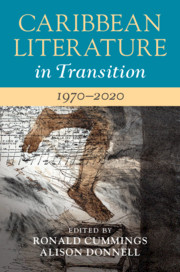Book contents
- Caribbean Literature in Transition, 1970–2020
- Caribbean Literature in Transition
- Caribbean Literature in Transition, 1970–2020
- Copyright page
- Contents
- List of Illustrations
- Contributors
- Acknowledgements
- Introduction: Caribbean Assemblages, 1970s–2020
- Part I Literary and Generic Transitions
- Chapter 1 Writing and the Responsibility to Memory: The Role of White Female Planters in Contemporary Caribbean Novels
- Chapter 2 Caribbean Identities and Diversifying the Creole Mix
- Chapter 3 Carnival, Calypso and Dancehall Cultures: Making the Popular Political in Contemporary Caribbean Writing
- Chapter 4 Life Writing, Gender and Caribbean Narrative 1970–2015: Itinerant Self-Making in the Postcolonial Caribbean
- Chapter 5 Forwarding Dubpoetry in this Generation: A Grassroots Performance and Neo-Literary Genre in Transition
- Chapter 6 Postcolonial Ruins, Reconstructive Poetics: Caribbean Urban Imaginaries
- Chapter 7 Reimagining Caribbean Time and Space: Speculative Fiction
- Chapter 8 Caribbean Drama and Performance
- Chapter 9 Here Are the Others: Caribbean Creative Nonfiction
- Chapter 10 ‘Let Every Child Run Wild’: Cultural Identity and the Role of the Child in Caribbean Children’s and Young Adult Fiction
- Part II Cultural and Political Transitions
- Part III The Caribbean Region in Transition
- Part IV Critical Transitions
- Bibliography
- Index
Chapter 7 - Reimagining Caribbean Time and Space: Speculative Fiction
from Part I - Literary and Generic Transitions
Published online by Cambridge University Press: 16 December 2020
- Caribbean Literature in Transition, 1970–2020
- Caribbean Literature in Transition
- Caribbean Literature in Transition, 1970–2020
- Copyright page
- Contents
- List of Illustrations
- Contributors
- Acknowledgements
- Introduction: Caribbean Assemblages, 1970s–2020
- Part I Literary and Generic Transitions
- Chapter 1 Writing and the Responsibility to Memory: The Role of White Female Planters in Contemporary Caribbean Novels
- Chapter 2 Caribbean Identities and Diversifying the Creole Mix
- Chapter 3 Carnival, Calypso and Dancehall Cultures: Making the Popular Political in Contemporary Caribbean Writing
- Chapter 4 Life Writing, Gender and Caribbean Narrative 1970–2015: Itinerant Self-Making in the Postcolonial Caribbean
- Chapter 5 Forwarding Dubpoetry in this Generation: A Grassroots Performance and Neo-Literary Genre in Transition
- Chapter 6 Postcolonial Ruins, Reconstructive Poetics: Caribbean Urban Imaginaries
- Chapter 7 Reimagining Caribbean Time and Space: Speculative Fiction
- Chapter 8 Caribbean Drama and Performance
- Chapter 9 Here Are the Others: Caribbean Creative Nonfiction
- Chapter 10 ‘Let Every Child Run Wild’: Cultural Identity and the Role of the Child in Caribbean Children’s and Young Adult Fiction
- Part II Cultural and Political Transitions
- Part III The Caribbean Region in Transition
- Part IV Critical Transitions
- Bibliography
- Index
Summary
While the naming of Caribbean works as speculative fiction has enabled the possibility of this regionally specific genre to take shape in the twenty-first century, there has been a long tradition of literary works that seek to represent alternative and multiple realities by fragmenting realist forms and employing the rich folkloric and spiritual traditions of the region. Figures such as the soucouyant and mermaid often symbolize gendered realities, the zombie represents psychological trauma, and spirits emphasize the continuation of the past in the present. Drawing on elements of fantasy, these works are thus often deeply informed by socio-political concerns and traumatic events, and arguably transform, rather than bypass, the historic character of Caribbean literature. Through the utopian/dystopian scenarios recognizable within speculative literature, readers are returned to the issues of memory, history and identity, while also pushing at the imaginative limits of community and embodiment in their creation of alternate possibilities.
Keywords
- Type
- Chapter
- Information
- Caribbean Literature in Transition, 1970–2020 , pp. 118 - 131Publisher: Cambridge University PressPrint publication year: 2021

